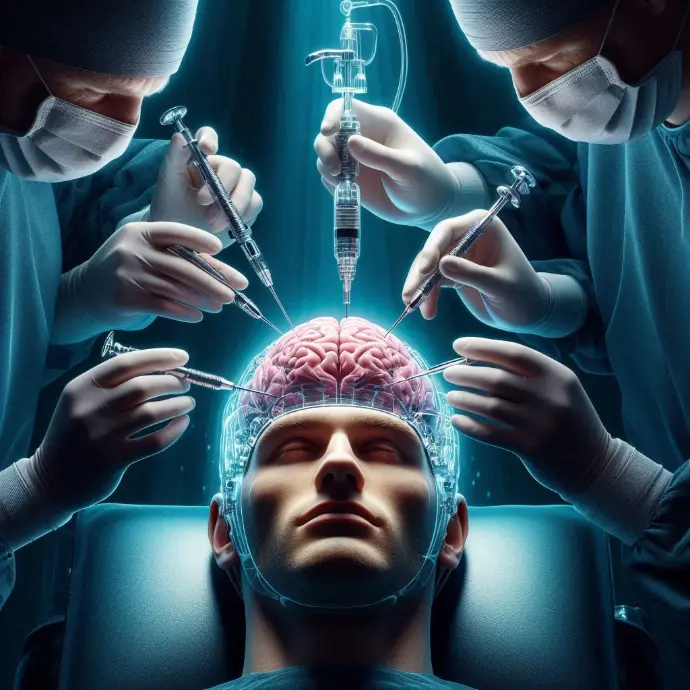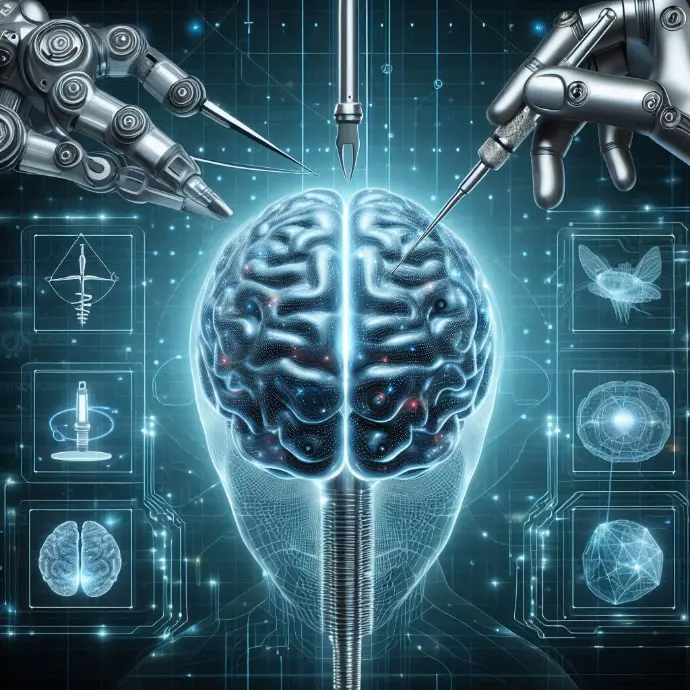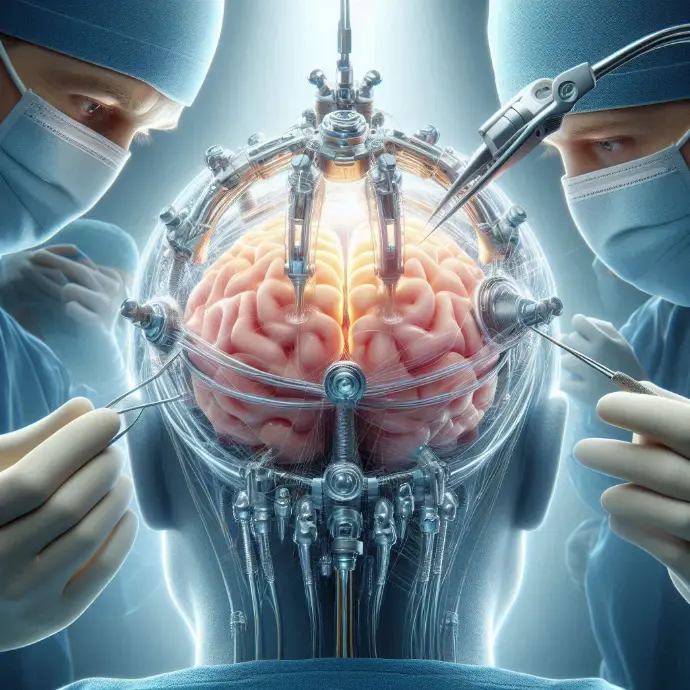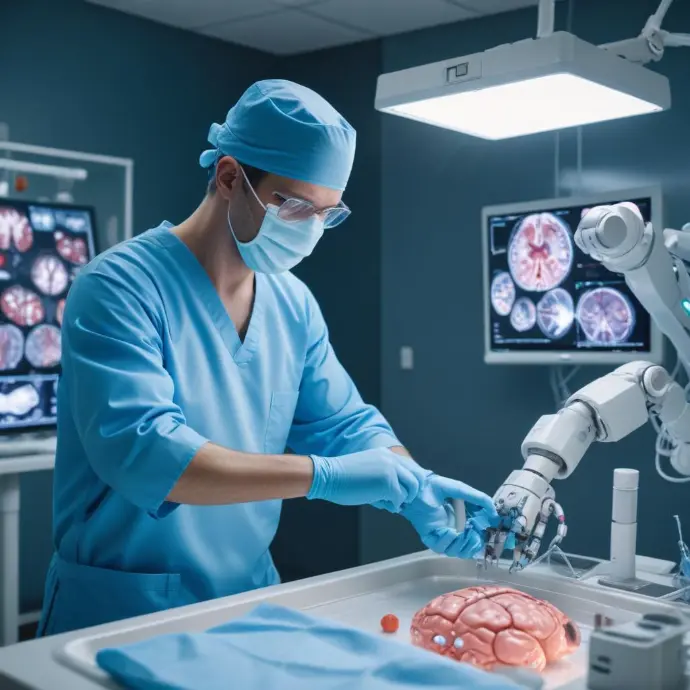
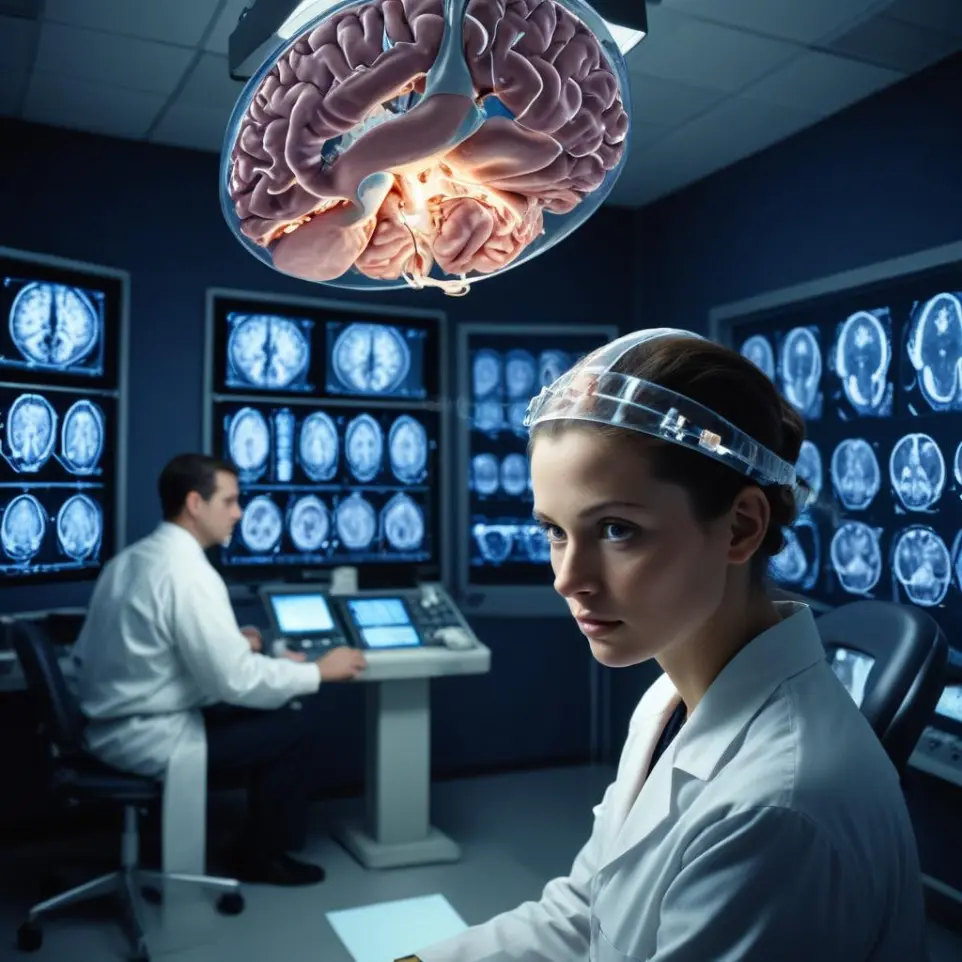
Brain Implants and AI: The Next Level in Neuroscience

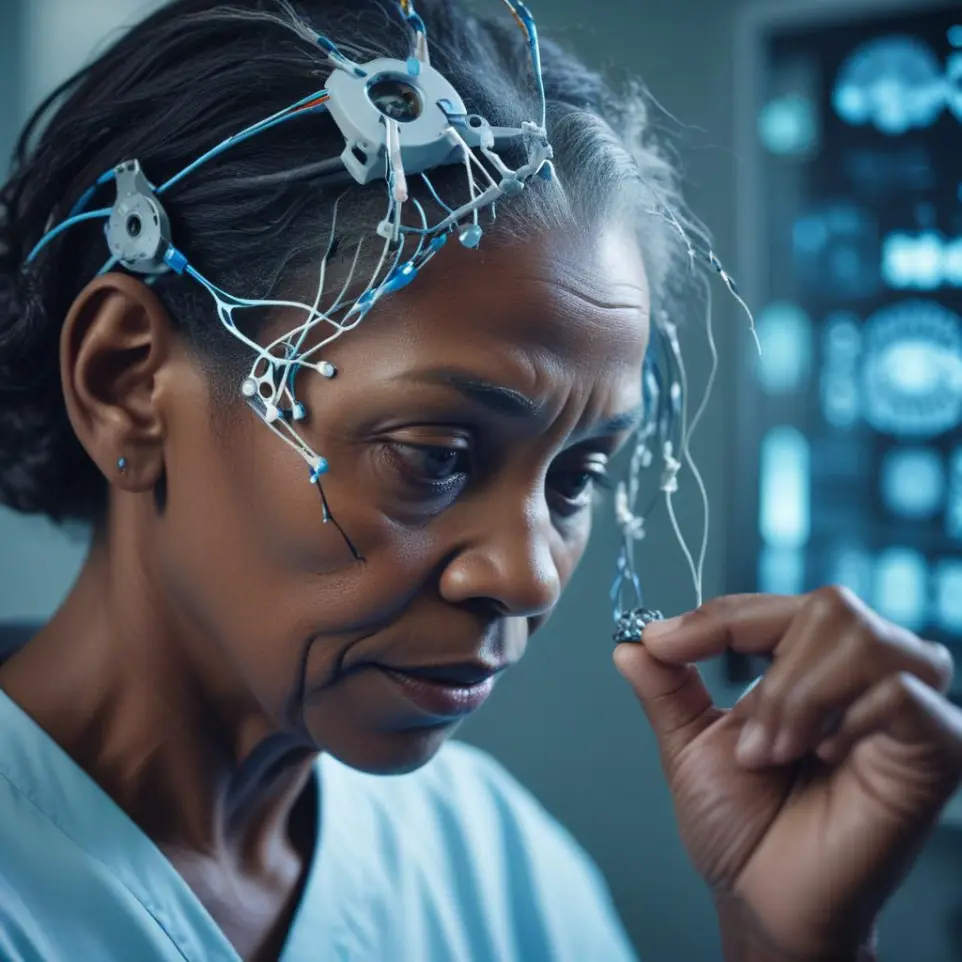
Immerse yourself in a world of wonder and discover the wonders and challenges of emerging technologies. In our feature article, "Brain Implants and AI: The Next Level in Neuroscience," we'll explore the fascinating world of advanced neuroscience and its relationship to artificial intelligence. Are you ready to explore the next level of technological evolution? Go ahead, the future awaits!
Introduction
In the field of medicine, Artificial Intelligence (AI) has seen significant advancements in recent years, revolutionizing the way various diseases are diagnosed and treated. The combination of AI with brain implants represents a milestone in neuroscience, opening up new possibilities for understanding and addressing neurological disorders more effectively. Next, we'll explore the impact of this convergence between AI and brain implants on the field of advanced neuroscience.
The application of AI in medicine has revolutionized the way large volumes of clinical data, medical images, and genetic patterns are analyzed to identify diseases, predict outcomes, and personalize treatments. Machine learning algorithms and neural networks have proven effective in early cancer diagnosis, detecting cardiac abnormalities, and predicting infectious disease outbreaks. Furthermore, AI has made it possible to optimize medical record management, streamline patient care, and improve operational efficiency in clinical settings.
AI's ability to analyze complex data and extract meaningful patterns has led to significant advances in precision medicine, where treatments are tailored to each patient's unique genetic and molecular characteristics. This personalized approach has improved treatment efficacy and paved the way for more effective and less invasive therapies. AI has transformed medicine by improving diagnosis, patient care, and clinical efficiency, laying the foundation for more precise and personalized medical practice.
Brain implants have represented a significant advance in the understanding and treatment of neurological disorders. These devices, which can record and stimulate brain activity, have been instrumental in the treatment of diseases such as epilepsy, Parkinson's disease, and treatment-resistant depression.
Furthermore, brain implants have made it possible to decipher patterns of neural activity, contributing to a better understanding of cognition, perception, and motor function. This technology has provided new insights into brain function and has laid the groundwork for the development of neural prosthetics and brain-computer interfaces that restore function in cases of neurological injuries.
Brain implants have revolutionized neuroscience by providing tools for researching and treating brain disorders, opening up new possibilities for improving the quality of life of patients with neurological conditions.
The integration of AI with brain implants has the potential to drive significant advances in the treatment of neurological disorders. By harnessing AI's ability to analyze and understand large volumes of neural data, AI-enhanced brain implants could offer new tools for the prediction and personalized treatment of diseases such as epilepsy, Alzheimer's disease, and autism spectrum disorder.
Furthermore, the combination of AI and brain implants could enable the development of more sophisticated brain-computer interfaces, expanding the possibilities for restoring motor and sensory function in cases of neurological injuries. This convergence also has the potential to improve our understanding of the brain mechanisms underlying cognition, opening new avenues for the development of therapies for neurodevelopmental disorders and neurodegenerative diseases.
The synergy between AI and brain implants promises to transform neuroscience, offering new tools for understanding, diagnosing, and treating neurological disorders, which could revolutionize healthcare in this field.
Brain Implants and Advanced Neuroscience
Brain implants play a crucial role in the treatment of neurological diseases, offering the potential to restore brain function lost due to injury or disease. These devices can help manage the symptoms of disorders such as Parkinson's disease, epilepsy, and treatment-resistant depression. Furthermore, brain implants are also being investigated for the treatment of traumatic brain injuries and neuropsychiatric disorders.
Thanks to advances in brain implant technology, patients with chronic neurological diseases have experienced significant improvements in their quality of life. These devices have proven effective in reducing disabling symptoms and, in some cases, restoring motor and cognitive function.
The ability of brain implants to directly influence brain activity has revolutionized the field of neurology, opening up new possibilities for the treatment of neurological diseases that previously had limited options.
In recent years, research in the field of brain implants and neuroscience has seen significant advances. More sophisticated electrodes have been developed, allowing for more precise and less invasive brain stimulation, reducing the risk of complications for patients. Likewise, progress has been made in understanding brain plasticity, leading to improvements in implants' ability to adapt and respond to changes in the brain over time.
Furthermore, the miniaturization of devices has allowed for the creation of more discreet and less intrusive brain implants, representing a major leap forward in terms of comfort and patient acceptance. These advances have expanded the reach of brain implants, opening up new possibilities for the treatment of a variety of neurological conditions.
Neuroscience research has also contributed to the development of more advanced brain-computer interfaces, which allow for more efficient communication between the brain and external devices. These interfaces have the potential to revolutionize the way people with neurological disabilities interact with the world around them, providing new opportunities for restoring lost functions.
The integration of Artificial Intelligence (AI) in neuroscience and brain implants has opened new frontiers in the treatment of neurological diseases. AI algorithms are used to analyze large volumes of brain data, allowing for a deeper understanding of brain activity and the identification of patterns associated with different neurological conditions.
Furthermore, AI has been applied in the development of more advanced brain-computer interfaces, which can more accurately interpret brain signals and translate them into commands for external devices. This has expanded the capabilities of brain implants, allowing for more precise control and greater customization of treatments for each patient.
In neuroscience, AI has helped accelerate brain imaging analysis and the identification of biomarkers for neurological diseases, facilitating early diagnosis and the development of more effective treatments. Furthermore, AI algorithms are used to model and simulate brain activity, leading to significant advances in understanding brain plasticity and the development of new therapeutic strategies.
The application of artificial intelligence (AI)-powered brain implants in neuroscience presents several significant advantages. First, these implants can be used to more accurately monitor and diagnose neurological disorders, allowing physicians and scientists to better understand brain function. Furthermore, AI-powered brain implants have the potential to improve patients' quality of life by providing brain-machine interfaces that allow them to recover motor or sensory functions lost due to neurological injuries or diseases.
However, the application of AI-powered brain implants in neuroscience also raises ethical and security challenges. On the one hand, the privacy of brain data and the possibility of manipulation through the brain-machine interface are major concerns that must be addressed. Furthermore, the accuracy and reliability of the AI algorithms used in brain implants are critical to ensuring the safety and effectiveness of these technologies, which requires extensive validation and regulation by the relevant authorities.
While AI brain implants promise significant advances in the field of neuroscience, it is crucial to carefully weigh the advantages and challenges associated with their application to ensure their use is ethical, safe, and beneficial to humanity.
Applications in Medicine
Brain implants have revolutionized the treatment of neurodegenerative diseases, such as Parkinson's disease and epilepsy, by providing direct electrical stimulation to the brain. This innovative approach has proven effective in controlling motor and non-motor symptoms associated with these diseases. Implanted electrodes can modulate abnormal neuronal activity, resulting in a significant improvement in patients' quality of life.
Furthermore, brain implants for the treatment of neurodegenerative diseases have paved the way for deeper research in the field of neuroscience, allowing scientists to better understand the underlying pathophysiology of these conditions and develop more targeted and effective therapies.
The ability of brain implants to provide precise and controlled brain stimulation represents a promising advance in the treatment of neurodegenerative diseases, offering hope to those suffering from these conditions.
In psychiatry and neurology, brain implants have opened up new possibilities for the monitoring and treatment of neuropsychiatric disorders, such as treatment-resistant depression and obsessive-compulsive disorder. These devices allow brain activity to be recorded in real time, providing invaluable information for understanding the pathophysiology of these conditions.
Furthermore, brain implants can offer deep brain stimulation therapies, which have been shown to be effective in relieving the symptoms of severe neuropsychiatric disorders. The ability to tailor brain stimulation in a personalized manner has led to significant improvements in the quality of life of patients who have not responded to other forms of treatment.
In this sense, brain implants represent hope for those suffering from debilitating neuropsychiatric disorders, by providing new therapeutic options and a deeper understanding of the biological basis of these conditions.
Artificial intelligence (AI) plays a crucial role in interpreting the vast volumes of data collected by brain implants. Using advanced algorithms, AI can analyze complex patterns in recorded neural activity, identify relevant biomarkers, and help healthcare professionals make informed treatment decisions.
Furthermore, AI can facilitate the personalization of therapies based on the collected information, allowing brain stimulation to be tailored precisely to each patient's needs. This personalization capability represents a significant advance in treatment optimization, taking into account individual variations in brain response.
The combination of brain implants and AI represents a powerful synergy in the advancement of neuroscience and medicine, opening new frontiers in the treatment of neurological and psychiatric conditions.
Ethical and Regulatory Considerations
The implementation of artificial intelligence brain implants poses a number of ethical challenges that must be carefully considered. One of the main ethical dilemmas lies in data privacy and security. The direct interconnection between the human brain and AI raises concerns about who has access to the information generated by these devices and how it will be used. Furthermore, the question of individual autonomy and the possibility that AI could influence a person's thinking and decision-making arises.
On the other hand, current and future regulations will play a crucial role in the implementation of this technology. It is essential to establish robust regulatory frameworks that guarantee the safety and effectiveness of AI brain implants. These frameworks must address aspects such as quality validation, authorization procedures, and ongoing oversight to ensure that ethical and safety standards are met.
The need for clear and effective regulations is evident, as the rapid evolution of technology can outpace the ability of regulatory bodies to keep up. Therefore, it is essential that regulations evolve in parallel with technological advances to ensure the ethical and safe use of AI brain implants in the field of advanced neuroscience.
The Future of Neuroscience with AI and Brain Implants
Brain implants and artificial intelligence are constantly evolving, opening up endless possibilities for the future of neuroscience. One of the most promising advances is the ability to restore brain function in patients with neurological injuries or disorders. This includes the possibility of improving mobility in patients with spinal cord injuries or the development of brain-computer interfaces that allow paralyzed patients to communicate and control devices with the power of their mind.
Furthermore, the integration of artificial intelligence into brain implants is expected to enable significant advances in the treatment of neuropsychiatric disorders such as depression, anxiety, and post-traumatic stress disorder. The ability to monitor and regulate brain activity through AI algorithms could revolutionize the way these disorders are treated.
In the research arena, the potential for brain implants to provide a deeper understanding of brain activity and cognitive processes is emerging. This could lead to significant advances in our understanding of the human brain and in the development of treatments for previously incurable neurological diseases.
The potential impact of the combination of brain implants and artificial intelligence on patients' quality of life is truly transformative. From restoring motor function to improving mental health, advances in this area have the potential to bring greater autonomy and well-being to individuals who previously faced significant limitations.
For patients with neurological injuries, the ability to regain mobility and communication through brain-machine interfaces not only represents a medical breakthrough but also a radical change in quality of life. Similarly, for those suffering from mental disorders, the prospect of more effective and personalized treatments offers hope and the promise of a more fulfilling life.
Furthermore, continued research in this area has the potential to benefit a wide range of patients, from those with neurodegenerative diseases to those struggling with psychiatric disorders. The impact on the quality of life of these individuals could be significant, providing new opportunities for well-being and overcoming challenges that previously seemed insurmountable.
The marriage of neuroscience, brain implants, and artificial intelligence represents exciting uncharted territory that promises to transform the way we understand and treat the human brain. With continued advances in this area, it is crucial to maintain a balance between innovation and ethics, ensuring that these developments are used responsibly and with patient well-being as a priority.
The potential to improve the quality of life of those facing neurological challenges is undeniable, and as this technology advances, it is critical that the ethical and social implications be carefully addressed. However, the future is bright, and with a balanced approach to research and implementation, brain implants and AI could open new frontiers in the treatment of neurological conditions and the improvement of patients' lives.

 IHRO NEWS
IHRO NEWS